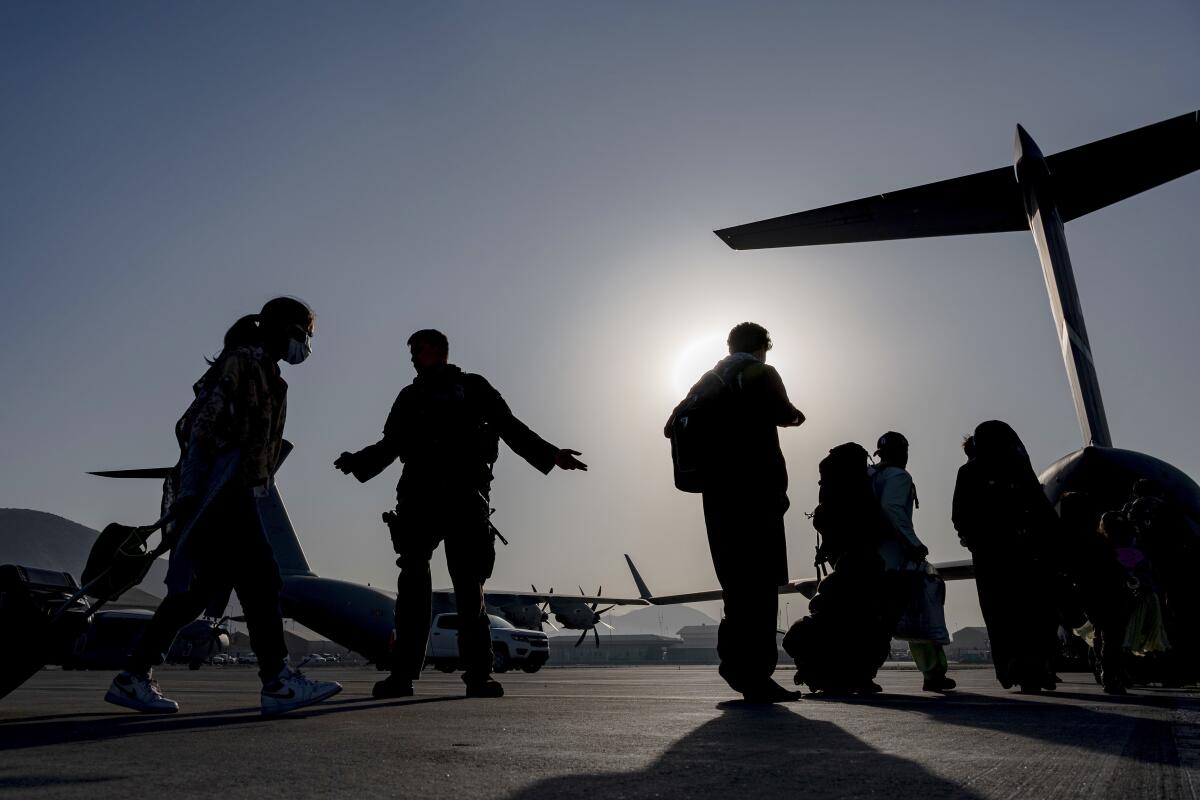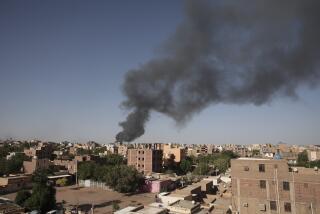As U.S. deadline looms, Poland and Belgium end Afghan evacuation

WARSAW — Poland and Belgium ended their evacuations from Afghanistan, but other European nations vowed Wednesday to press on for as long as possible, as the clock ticks down on a dramatic airlift of people fleeing Taliban rule ahead of a full American withdrawal.
President Biden said he will stick to his Tuesday deadline for completing the U.S. pullout, as the Taliban insisted he must, ramping up pressure on the already risky operation to fly people out of Kabul.
European allies pressed for more time but lost the argument, and as a practical matter they may be forced to end their evacuations a couple of days before the last American troops leave. Several countries haven’t said yet when they plan to end their operations, perhaps hoping to avoid yet another fatal crush at the Kabul airport, which is one of the last avenues out of the country.
The Taliban wrested back control of Afghanistan nearly 20 years after they were ousted in a U.S.-led invasion following the Sept. 11 attacks, which Al Qaeda orchestrated while being sheltered by the group. Its return to power has pushed many Afghans to flee, fearing reprisals or a return to the brutal rule it imposed when it last ran the country.
Thousands of people are still thought to be trying to leave, and it’s not clear that all of them will be able to before the end of the month. But any decision by Biden to stay longer could reignite a war between the Taliban and Western troops running the airlift.
“Due to extreme tension on the ground ... and the scheduled departure of American forces, these evacuations are a true race against time,” French government spokesman Gabriel Attal said Wednesday. He said that his country’s evacuation would probably end “a few hours, maybe a few days ahead” of the American departure.
The Taliban said it would allow normal commercial air traffic to resume when it assumes control of the airport after Tuesday, but it’s unclear whether airlines would be willing to fly into an airport controlled by the militants.
With the deadline looming, Marcin Przydacz, a Polish deputy foreign minister, said Wednesday that a group of people taken from Kabul that is now in Uzbekistan was the last evacuated by Poland. He said his nation made its decision to not continue operations after consulting with the U.S. and British officials.
Families of U.S. citizens and Afghans trapped in Kabul have turned to Congress for help. But lawmakers say there’s only so much they can do.
“After a long analysis of reports on the security situation, we cannot risk the lives of our diplomats and of our soldiers any longer,” Przydacz said.
A number of troops will remain briefly to wrap up operations, Przydacz said. Poland has used more than a dozen planes to bring hundreds of evacuees to Warsaw. Some later traveled on to other countries.
Hours later, Belgian Prime Minister Alexander De Croo said his country ended its evacuation flights carrying people from Kabul to Pakistan. The government made the decision “given the evolution of the situation in Afghanistan and in agreement with its European partners,” he tweeted.
“Belgium will continue to repatriate to our country those people evacuated” in the days ahead, De Croo said. More than 1,100 people have been flown to Belgium in recent days.
The Czech Republic declared its own evacuation mission complete last week, and Hungary said it plans to end its operations soon.
The White House said Wednesday that about 19,000 people were evacuated from Kabul over the last 24 hours. It said the U.S. has evacuated or facilitated the evacuation of about 82,300 people since the Taliban takeover in mid-August.
Secretary of State Antony J. Blinken said as many as 1,500 Americans may be awaiting evacuation, a figure that suggests that part of the U.S.-led airlift could be completed before the Tuesday deadline. The State Department estimates there were about 6,000 Americans who wanted to leave Afghanistan when the airlift began Aug. 14, and about 4,500 of them have been evacuated, Blinken said.
Pentagon spokesman John Kirby said the military will “continue to evacuate needed populations all the way to the end.” But he added that in the final days and hours, there will have to be a balance as the 5,400 troops in Kabul and critical systems also need to be withdrawn.
In Kabul itself, life has been slow to return to normal, but many people — especially women — are staying inside, fearful of the Taliban or the general instability.
Kabul Mayor Dawood Sultanzoy said many city workers have yet to return to their jobs, with the absence of experienced staff hindering normal operations. But he said the city has begun to remove the blast walls that became ubiquitous in recent years as the Taliban and other armed groups carried out bombings and other attacks against the Western-backed government.
The Taliban says the decades of war are over and there will be no revenge attacks on people who opposed them. But many Afghans distrust the group, and there have been reports of summary executions and other abuses in areas under Taliban control. Many fear a return to the Taliban’s hard-line Islamist rule of the 1990s, when women were largely confined to their homes.
Chaos at the Kabul airport has transfixed the world after the Taliban’s blitz across Afghanistan saw it seize control of a nation that received hundreds of billions of dollars in reconstruction aid and security support since the 2001 U.S.-led invasion.
Reps. Seth Moulton (D-Mass.) and Peter Meijer (R-Mich.) flew unannounced into Kabul airport in the midst of the chaotic evacuation Tuesday.
Afghans poured onto the tarmac last week, and some clung to a U.S. military transport plane as it took off, later plunging to their deaths. At least seven people died that day, and another seven died Sunday in a panicked stampede.
Thousands have thronged the airport in the days since, and the U.S. and its allies have worked to speed the evacuation in recent days, sometimes flying people out before their paperwork is fully processed and bringing them to transit points in Europe or Asia. On Wednesday, a group of 51 people landed in Uganda, which became the first African nation to serve as a transit point.
European nations, including American allies Germany and Britain, had pressed for a longer period to continue evacuations past the deadline next week. However, Biden has stuck to the August date, even after an emergency online summit of the Group of 7 nations.
That left European nations with no choice but to abide by the deadline.
Breaking News
Get breaking news, investigations, analysis and more signature journalism from the Los Angeles Times in your inbox.
You may occasionally receive promotional content from the Los Angeles Times.
“That the overall deployment literally stands and falls with the stance of the militarily strongest member of the alliance, the U.S., was always clear to us,” German Chancellor Angela Merkel said in a speech to Parliament.
“We will continue the evacuation operation for as long as possible,” she added, without specifying when operations would end.
For now, the U.S. military coordinates all air traffic in and out of the Kabul airport. Taliban spokesman Suhail Shaheen wrote on Twitter that “people with legal documents” will be able to fly out of Kabul airport via commercial flights after the August deadline.
U.S. and its allies Friday stepped up evacuation efforts from the Afghan capital, Kabul, where thousands of desperate people ringed the airport
On Wednesday, a stream of military planes took off from the airfield as evacuees lined up on the tarmac. The desperate remained outside, some standing knee-deep in sewage and waving identity documents at Western soldiers in hopes of being allowed to go beyond the barbed-wire fencing and onto a flight out.
While the final withdrawal date is just under a week away, analyst Patricia Lewis said the practical deadline for the evacuations to stop was “the next couple of days.”
“You can’t just say, ‘OK, midnight, we’ll stop now, we’ll just pack up gently,’” said Lewis, director of the international security program at the Chatham House international affairs think tank in London.
“All of the allies are highly dependent on the U.S. for military cover, particularly air cover,” Lewis said. “They can’t put their own people at risk, so it really depends on when the U.S. starts packing up.”
Associated Press writers Jon Gambrell in Dubai, United Arab Emirates, Tameem Akhgar in Istanbul, Turkey, Jill Lawless in London, Karel Janicek in Prague, Geir Moulson in Berlin, Sylvie Corbet in Paris, Joseph Krauss in Jerusalem and Lolita C. Baldor in Washington contributed to this report.
More to Read
Sign up for Essential California
The most important California stories and recommendations in your inbox every morning.
You may occasionally receive promotional content from the Los Angeles Times.













